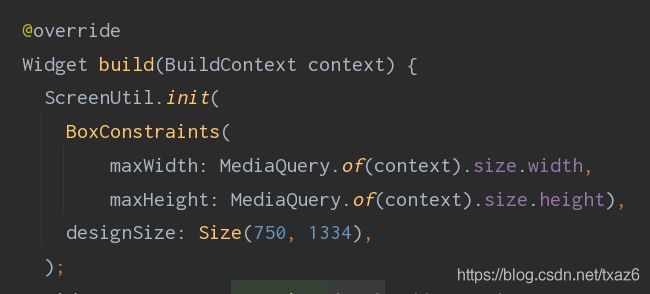Flutter-阿里P7告诉我的屏幕适配终极方案!!!
前言:我相信每个移动端开发者都避不开这个问题,就是屏幕适配
目前移动端的设备已经非常多,并且不同的设备手机屏幕也不相同。
目前做移动端开发都要针对不同的设备进行一定的适配,无论是移动原生开发、小程序、H5页面。
所以这篇文章咱们来讲讲屏幕适配,阿里P7告诉我的适配方案!
最最最重要的一点:宽度一般根据屏幕宽度算 高度看情况 文字按UI的来 高度不限制!!!
多使用Expanded这样自适应的组件!!
我们可以根据设备信息来进行适配:
获取屏幕上的一些信息,可以通过MediaQuery:
// 1.媒体查询信息
final mediaQueryData = MediaQuery.of(context);
// 2.获取宽度和高度
final screenWidth = mediaQueryData.size.width;
final screenHeight = mediaQueryData.size.height;
final physicalWidth = window.physicalSize.width;
final physicalHeight = window.physicalSize.height;
final dpr = window.devicePixelRatio;
print("屏幕width:$screenWidth height:$screenHeight");
print("分辨率: $physicalWidth - $physicalHeight");
print("dpr: $dpr");
// 3.状态栏的高度
// 有刘海的屏幕:44 没有刘海的屏幕为20
final statusBarHeight = mediaQueryData.padding.top;
// 有刘海的屏幕:34 没有刘海的屏幕0
final bottomHeight = mediaQueryData.padding.bottom;
print("状态栏height: $statusBarHeight 底部高度:$bottomHeight");
咱们有两种适配方式:
1,自己根据设备信息组装,这样可以更好的实现自己需要的功能
2,使用第三方库:flutter_screenutil(功能也很强大,主要使用很方便)
咱们两种方式都讲一讲,哈哈
1,自己根据设备信息组装
import 'package:flutter/material.dart';
import 'dart:ui';
class ScreenAdapt {
//屏幕参数获取api
static MediaQueryData mediaQuery = MediaQueryData.fromWindow(window);
static double screenwidth; //设备屏幕宽度width
static double screenheight; //设备屏幕高度height
static double topheight; //顶部空白高度
static double bottomheight; //底部空白高度
static double devicepixelratio = mediaQuery.devicePixelRatio; //分辨比
static var screenratio; //屏幕宽比
//初始化 uinumber:UI设计图 比如750、1920等
static initialize(int uinumber) {
screenwidth = mediaQuery.size.width;
screenheight = mediaQuery.size.height;
int uiwidth = uinumber is int ? uinumber : 750; //默认是1920 ui设计图
screenratio = screenwidth / uiwidth; //屏幕宽比 设备宽度 : ui设计图宽度
}
//实际填写长度
static px(number) {
if (!(screenratio is double || screenratio is int)) {
ScreenAdapt.initialize(750);
}
return number * screenratio; //返回处理好的长度数值
}
//获取设备屏幕宽度
static screenWidth() {
screenwidth = mediaQuery.size.width;
return screenwidth;
}
//获取设备屏幕高度
static screenHeight() {
screenheight = mediaQuery.size.height;
return screenheight;
}
//获取设备顶部空白高度
static topHeight() {
topheight = mediaQuery.padding.top;
return topheight;
}
//获取设备底部空白高度
static bottomHeight() {
bottomheight = mediaQuery.padding.bottom;
return bottomheight;
}
}
使用实例
Container(
width: ScreenAdapt.px(1500),
//height: ScreenAdapt.px(800),尽量不去设置高度
decoration: BoxDecoration(
borderRadius: BorderRadius.circular(23.0),
image: DecorationImage(
image: new NetworkImage(
"https://i.henghajiang.com/login_img.png"),
fit: BoxFit.none)),
),
注意一点,这里的长宽分别指什么哦
这个封装比较简单,大家可以自己diy
2,使用第三方库:flutter_screenutil
(1)引入步骤:
pubspec.yaml中引入最新的:
flutter_screenutil: ^5.0.0 #屏幕适配 (这个版本功能完全够用)
(2)初始化:
在4.0.0之前的版本呢初始化时这样的:
ScreenUtil.init(context, width: 750, height: 1334, allowFontScaling: false);
之后呢是这样的:
ScreenUtil.init(
BoxConstraints(
maxWidth: MediaQuery.of(context).size.width,
maxHeight: MediaQuery.of(context).size.height),
designSize: Size(750, 1334),
);
(3) 使用方式
dart版本2.0.0之前:
Container(
width:ScreenUtil().setWidth(200)
height:ScreenUtil().setHeight(180)
}
dart版本2.0.0之后(包括2.0.0):
Container(
width:200.w
height:180.h
}
长宽相等:
Container(
width:200.w
height:200.w
)
其他的api:
ScreenUtil.pixelRatio //设备的像素密度
ScreenUtil.screenWidth //设备宽度
ScreenUtil.screenHeight //设备高度
ScreenUtil.bottomBarHeight //底部安全区距离,适用于全面屏下面有按键的
ScreenUtil.statusBarHeight //状态栏高度 刘海屏会更高 单位px
ScreenUtil.textScaleFactory //系统字体缩放比例
ScreenUtil.getInstance().scaleWidth // 实际宽度的dp与设计稿px的比例
ScreenUtil.getInstance().scaleHeight // 实际高度的dp与设计稿px的比例
是不是很简单!记住这句话:宽度一般根据屏幕宽度算 高度看情况 文字按UI的来 高度不限制!!!
配合自适应组件,完美适配屏幕!!
欢迎留言纠正 ~ 不妨给个点赞哈哈
我是阿T一个幽默的程序员 我们下期再见~
添加我为你的好友,领取源码以及Flutter学习资料~




